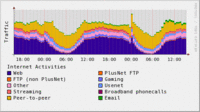 One problem with outfits like MySpace and Facebook is the same as
that with shopping malls: they feel sort of like public space,
but they’re not.
They’re privately owned and operated, and you never know what
the private cops are doing with their security camera information,
or the stores are doing with all that purchase information.
In the case of Facebook, when Facebook announced (to advertising
executives, not to its own users)
its Beacon system to provide its users information to companies
for targetted ads, and that Coca-Cola, Sony, and Verizon had
already signed up,
Om Malik told Facebook’s users (and the Internet at large),
and the users didn’t like it.
One problem with outfits like MySpace and Facebook is the same as
that with shopping malls: they feel sort of like public space,
but they’re not.
They’re privately owned and operated, and you never know what
the private cops are doing with their security camera information,
or the stores are doing with all that purchase information.
In the case of Facebook, when Facebook announced (to advertising
executives, not to its own users)
its Beacon system to provide its users information to companies
for targetted ads, and that Coca-Cola, Sony, and Verizon had
already signed up,
Om Malik told Facebook’s users (and the Internet at large),
and the users didn’t like it.
Facebook tried ignoring Malik, tried painting him as an elitist pundit, and finally announced users will be explicitly asked whether they want to publish the information that Beacon uses. Facebook didn’t do this until after moveon.org got involved and turned it into a political issue. Malik is chortling over bringing about this Facebook about-face in only three weeks: from 7 to 29 November.
The moral here seems obvious, and twofold:
- Internet users do expect some modicum of privacy.
- An Internet company can’t announce something to somebody else that affects its users without the users finding out about it.
-jsq







